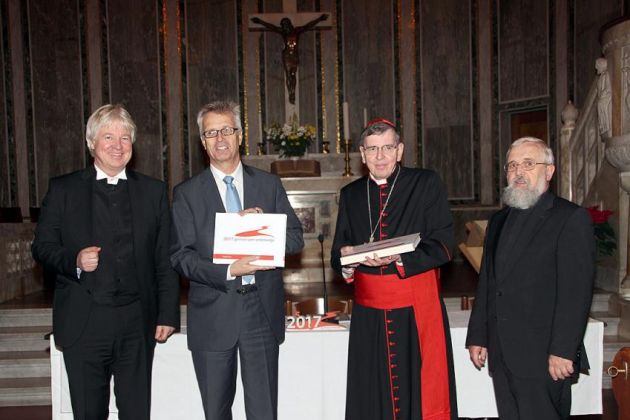Lutherans, Vatican move closer on 500-year Reformation anniversary cooperation

The general secretary of the Lutheran World Federation, Rev. Martin Junge, says relations between the Lutheran and Catholic churches have reached an epoch-making turning-point.
He was speaking during preparations for the 500th anniversary of the Protestant Reformation in 2017 when Lutherans and Catholics are expected to cooperate in an act of Christian unity.
Junge was speaking during a discussion December 18 in the Lutheran church in Rome, where he said the relationship between Lutherans and Catholics is being transformed "from conflict to communion," the LWF said in a December 19 statement.
In a world "in which religion and faith are regularly portrayed and perceived as trouble makers," Junge hailed the movement of the Lutheran and Roman Catholic churches "towards a profound communion that frees us to serve God and the world."
It is almost 500 years since Martin Luther was at the forefront of the Reformation that later pitted Catholics and Protestants against one another for many years, often in bloody confrontations.
With Junge at the Rome discussions were prominent Catholic leaders such as the president of the Pontifical Council for Promoting Christian Unity Kurt Cardinal Koch, the Catholic representative at the United Evangelical Lutheran Church of Germany Bishop Karl-Hinrich Manzke, and the chairperson of the Ecumenism Commission of the German Episcopal Conference Bishop Gerhard Feige.
Junge and Koch jointly announced plans for a common liturgical guide relating to the 500th anniversary of the Reformation in 2017, for which publication is scheduled in 2015.
The Protestant Reformation was the 16th-century schism within Western Christianity started by people questioning Catholic doctrine and practices, such as Martin Luther, John Calvin and other early Protestants.
The panelists in Rome agreed on the question of a joint act of repentance between Lutherans and Catholics.
'SYMBOLIC ACT'
"I think it would be a fine thing if such a symbolic act could take place between Catholics and Lutherans," said Koch. However, it would not be about unilateral mistakes or demands for penitence.
"The Catholic side is not telling the Lutherans that they should repent," noted Feige.
Both sides shared a burden of guilt, Koch and Feige agreed, the LWF said in its statement.
Looking towards 2017, the Lutheran - Roman Catholic material is intended to enable churches all over the world to review the 500 years of Reformation.
The guide will follow on from the dialogue document From Conflict to Communion published by both partners in 2013, and transpose it into liturgical acts.
The material will reflect the structure of this document with its triple form of penitence for the wounds mutually inflicted; joy at the insights and dimensions of the Reformation; and hope for unity.
LWF and PCPCU representatives had jointly signed their joint declaration on October 31, 1999 in Augsburg, Germany, officially declaring that mutual condemnations at the time of the 16th century Reformation do not apply to their current teaching.
The panel in Rome also discussed the question of what is to be commemorated in 2017.
"Not church division, nor the 500th anniversary of a church and certainly not any heroic actions," Feige stated.
"But what then? Placing Christ in the middle of the celebrations around 2017 and in this way celebrating a festival of Christ would build a bridge for both partners."